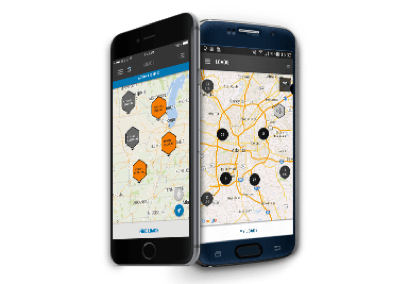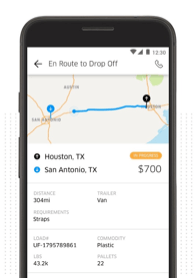C.H. Robinson: Responding to Uber Freight

C.H. Robinson is the largest freight brokerage business in the United States. How will they respond to the 'Uber-ification' of the trucking industry?
C.H. Robinson Worldwide, Inc. (NASDAQ: CHRW) is the largest freight brokerage firm by revenue in the United States [1]. The company connects shippers (such as manufacturers) with shipping services provided by a fragmented marketplace of small contract carriers. In 2016, 81% of shipments were contracted with carriers who operate less than 100 trucks [2].
Exhibit 1: C.H. Robinson 2016 shipper and carrier concentration
Source: C.H. Robinson 2016 Annual Report
C.H. Robinson’s value to shippers is its knowledge of the mobile, fragmented, and opaque US long-haul trucking marketplace. Shippers, especially those with complex requirements (e.g., refrigeration) would find it difficult to build relationships with small contract carriers on their own. Similarly, contract carriers would likely have difficulty finding customers. C.H. Robinson facilitates transactions by serving as a “market maker.” In exchange, the company typically receives a 12% commission on the cost of shipping [3].
The company historically relied on human freight brokers to facilitate transactions [4]. Their rationale was that many shippers had custom needs – such as refrigeration, expiry dates, or light exposure restrictions – which the company needed to accommodate on a case-by-case basis. Today’s digital tools can increasingly handle such complexities, often more efficiently than any human.
The efficiency and cost advantage provided by digitization has proven disruptive in other industries. Uber, a ride-sharing company recently valued at $68 billion, is one of the most visible and successful examples [5]. By automating driver-rider matching and route guidance, Uber realized significant cost and quality advantages over traditional taxicab agencies. It was then able to lower rates for passengers and increase market share.
C.H. Robinson executives recognized the potential for an Uber-like disruption in the freight brokerage industry. In 2012, they launched Navisphere, a technology platform for managing transportation and sourcing activities across the C.H. Robinson network [6]. The platform has experienced modest success, with over 220,000 organizations connected by the end of 2016 [7].
Uber enters the market
In May 2017, after months of operating in stealth mode, Uber Freight officially launched [8]. The service was initially narrow in scope: Uber Freight only operated in Texas, and was limited to 53-foot dry and refrigerated freight. However, Uber publicly stated its ambitions to grow in the space. As Uber Freight’s director, Bill Dreigart, said: “Uber brings the tech capability and depth of resources and talent that nobody in the space can match [9].”
Exhibit 2: Current state: NaviSphere and Uber Freight contract carrier interface
C.H. Robinson NaviSphere Uber Freight
In the short term, Uber Freight’s launch posed little risk to C.H. Robinson due to its limited scope and service area. Goldman Sachs wrote: “we do not think that the introduction of disruptive technologies will take significant market share from CHRW in the near term.” However, they said, “it does provide further price transparency to the industry, [which] is likely to pressure margins [10].” The company continues to invest approximately $25 million per year in growing its online platform, NaviSphere [11].
In the medium to long term, companies like Uber Freight pose an existential risk to C.H. Robinson’s human-centered business model. The improved information offered by digitization reduces the value of C.H. Robinson’s relationships and market knowledge.
Recognizing this, management invested in several areas that could help in adjusting to the new long-term dynamics of the freight brokerage industry. They formed TMC, a division of C.H. Robinson, in 1999 to provide supply chain technology and consulting services to freight brokerage customers [12]. They also re-positioned the company as a provider of managed third-party logistics (3PL) services, which offer higher margins and improved customer stickiness. However, in 2016, TMC and 3PL solutions comprised just 5.3% of C.H. Robinson’s annual revenue [13]. The vast majority of revenue came from freight brokerage.
C.H. Robinson: A tech company?
“We fundamentally believe that computers are better at logistics than human beings.”
–Kevin Novak, Head of Data Analytics, Uber
Succeeding in the new, increasingly digitized world of freight brokerage will likely require significant changes in C.H. Robinson’s workforce, culture, and processes. Making these changes may not be easy. For example, the company will likely require more IT expertise, but it may prove difficult to hire talented engineers to work at the company’s headquarters in Eden Prairie, Minnesota. These issues are made even more important by the strong network effects present in digital marketplaces, which lead to winner-take-all outcomes [14]. To succeed, C.H. Robinson’s management team must create a feasible plan to ramp up their digital efforts to compete with technically talented, well-capitalized competitors such as Uber while maintaining focus on its core brokerage business.
Strategic direction: reinvest or harvest?
Digitization in the freight brokerage industry seems inevitable. Should C.H. Robinson try to reinvent itself as a company focused on digital logistics platforms? The company is publicly held. Might its investors be better served if the company instead harvested any remaining profits and returned capital to shareholders?
(Word count: 762)
References
1 Transport Topics (2017). Top 50 Logistics Companies. [online] Available at: http://www.ttnews.com/top50/logistics/2017 [Accessed 12 Nov. 2017].
2 C.H. Robinson Worldwide, Inc. (2017). C.H. Robinson Annual Report 2016. [online] Available at: https://investor.chrobinson.com/Financials/Annual-Reports/default.aspx [Accessed 12 Nov. 2017].
3 McKevitt, J. (2017). Convoy, an Uber Freight competitor, receives new round of funding from Bill Gates. [online] Supply Chain Dive. Available at: https://www.supplychaindive.com/news/Convoy-Uber-Freight-trucking-tech-Bill-Gates/447857/ [Accessed 12 Nov. 2017].
4 Davies, A. (2017). With Uber Freight, Travis Takes On Trucking. Wired. [online] Available at: https://www.wired.com/2017/05/uber-freight/ [Accessed 12 Nov. 2017].
5 MacMillan, D. (2016). Uber Raises $3.5 Billion From Saudi Fund. The Wall Street Journal. [online] Available at: https://www.wsj.com/articles/uber-raises-3-5-billion-from-saudi-fund-1464816529 [Accessed 12 Nov. 2017].
6 C.H. Robinson Worldwide, Inc. (2012). C.H. Robinson Introduces NaviSphere. [online] Available at: http://www.sdcexec.com/news/10831882/ch-robinson-introduces-navisphere [Accessed 12 Nov. 2017].
7 C.H. Robinson Annual Report 2016.
8 Uber Freight (2017). Uber Freight — Leveling the Playing Field for America’s Truck Drivers. [online] Available at: https://medium.com/official-uber-freight-blog/uber-freight-leveling-the-playing-field-for-americas-truck-drivers-73530215a1f1 [Accessed 12 Nov. 2017].
9 Rafter, M. (2017). Uber Jumps into Trucking, Launches Uber Freight. [online] Trucks.com. Available at: https://www.trucks.com/2017/05/18/uber-launches-uber-freight/.
10 Goldman Sachs Investment Research (2017). Derailment and Development; Initiate on Rails at Cautious, Airfreight/Logistics at Attractive. Americas Transportation. Goldman Sachs Investment Research.
11 C.H. Robinson Annual Report 2016.
12 TMC, a division of C.H. Robinson. (2017). Our Story | TMC, A Division of C.H. Robinson. [online] Available at: https://www.mytmc.com/en-US/About/Our-Story/ [Accessed 12 Nov. 2017].
13 C.H. Robinson Annual Report 2016.







Interesting topic and I can speak from experience using CH Robinson that they offer a great product, but I think the issue with shipping will always come down to customer cost. I feel customers in the shipping market are so price sensitive that the value add will always be cost savings and not added services/support. As you mention, CH Robinson has many logistics offering but they have never taken off; their bread and butter value proposition is contracting freight. If they cannot stay a reliable low cost provider, which is what brings most customers to them in the first place, they risk becoming a niche broker with a long tail as they phase out and the cheaper digital market grows.
Facing those options, I would argue they do not have a choice and have to develop the digital platforms because they owe it to their shareholders to stay ahead of the market they fought to create and own in the first place. But I do not see the digital market as a re-invention but a continuation of their already existing broker services. It does not change their business model but add to the exposure and use of their already existing brokerage.
I would be interested to learn about how CH Robinson plans to not only compete with Uber but also with Tesla’s new semi truck fleet. It has become increasingly apparent that the best wedge into the automated driving sector is through trucks/freight vehicles. Uber isn’t going to be the only company to disrupt this sector and CH Robinson is going to have to prepare for that harsh reality.
As you pointed it, it will be difficult for C.H. Robinson to transform its fright brokerage offering into a competitive digital marketplace. Uber and other well funded startups such as Convoy, which recently raised $62M from investors, [1] are more competent with technology.
However, C.H. Robinson can add significant value to its digital marketplace by integrating it seamlessly with its TMC and 3PL solutions. For example, shippers that use pure play digital platforms such as Uber may have trouble integrating those platforms with their supply chain analytics centers. Whereas C.H. Robinson can ensure that it’s marketplace data is properly utilized by the shipper to improve its end-to-end supply chain.
[1] https://www.wsj.com/articles/freight-booking-startup-convoy-raises-62-million-1500966000
Great write-up! This is a perfect case study of how the failure of an incumbent player to adopt to a disruptive force leveraging the power of supply-chain digitization can potentially bring about its demise. While I don’t know that CH Robinson can compete with Uber or Convoy from a technology front, it also seems like their only other long-term option – other than evolve technologically – is to die a slow death. This article raises the point that the company’s main differentiator is its relationships and intimate knowledge of its shippers. That’s all well and good, but as technology enables its competitors to offer: 1) better services and 2) more data/informed decisions, at a 3) cheaper price, the institutional knowledge that CH Robinson possesses starts to look a lot less attractive by comparison. If I were an exec at the company, I would seriously look into potential partnerships with up-and-coming automated freight companies (e.g. the next Convoy) to leverage the power of the company’s institutional partnerships with the product that is inevitably going to power the future of the industry.
Great article! This issue gets at the heart of many discussions we have had in class regarding the impact that Clay Christensen writes about regarding disruptive innovation. I think that the only option for C.H. Robinson is to compete on a digital scale with uberfreight. The technology that uber offers is not so much of an edge at this point in time (there are many flaws with its system) to not try to address as a company how it can use technology to improve its supply chain. The above comments do bring up an important point into how self-driving trucks will impact C.H Robinson additionally. If C.H. Robinson is not willing to making the investing into the digital space and to compete, they may as well harvest their profits because it will be a dramatic fall from the top as they fail to compete in a new digital world.